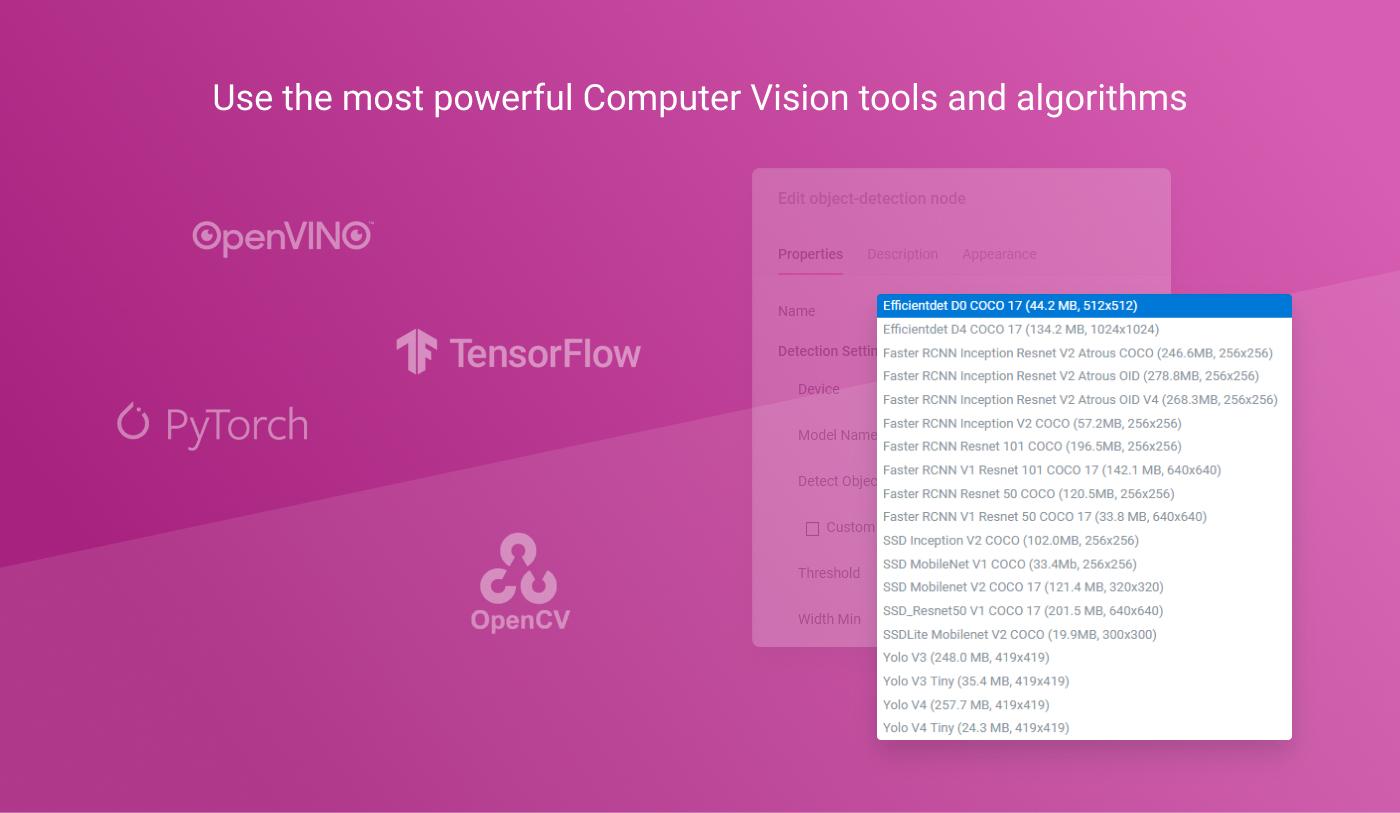Integrated AI model manager
Viso Suite allows teams to import, manage, version, and reuse AI models in one place.
- Pre-Trained Algorithms
Viso Suite provides a set of the most popular and best AI algorithms that have been trained on massive datasets. Those AI models can be used to build computer vision applications in the no-code editor. The AI vision experts at viso.ai are constantly scouting and integrating the best-performing algorithms and deep learning models. - Import Custom Algorithms
Teams can import custom-trained or re-trained AI models using the AI model manager of Viso Suite. Custom algorithms can be used to recognize and detect special objects, events, or anomalies in real-time. The integrated data-collection abilities of Viso make it possible to achieve mission-critical accuracy with small datasets. - Deploy and swap AI models
AI models can be used with modules, the building blocks in the visual editor, to develop and update applications rapidly. The AI model manager is closely integrated with the Visual Builder of Viso Suite, AI models can be set and exchanged with one single click. The ability to update the AI model and versions safely is a fundamental part of Viso’s future-proof architecture.
Deep learning frameworks and libraries
Viso Suite supports all popular deep learning frameworks for computer vision, including the following:
- TensorFlow 2.0 (TF). The popular open source TensorFlow machine learning library focused on neural networks. Originally developed by Google Brain.
- TensorFlow Lite (TF Lite). TensorFlow Lite is a deep learning framework for on-device inference (Edge AI). It is optimized for ML on Edge Devices.
- OpenVINO. OpenVINO tools optimize deep learning models for inference tasks on Intel hardware including CPU, integrated GPU, and Movidius VPU.
- PyTorch. The most popular open source ML library PyTorch was developed by Facebook, it is based on the Torch library. PyTorch is used by Tesla and UBER to power computer vision solutions.
- Chainer. Chainer is a deep learning framework widely used for the development and application of deep learning methods. It supports NVIDIA CUDA for high-performance applications.
- OpenCV. OpenCV is the most popular computer vision library developed by Intel. It is aimed at real-time computer vision and features GPU acceleration.
- OpenPose. OpenPose is a real-time multi-person detection library. It is one of the most popular open-source pose estimation technologies.
- OpenPifPaf. OpenPifPaf is a neural network architecture for semantic keypoint detection (human body joints) and pose estimation at high speed.

Object detection AI models
Use the best performing pre-trained deep learning models and neural networks for object detection.
| CPU |
|
| VPU |
|
| GPU |
|
| TPU |
|
Image classification AI models
Robust pre-trained deep learning models and neural networks for image classification.
| CPU |
|
| VPU |
|
| GPU |
|
| TPU |
|
Keypoint detection AI models
Pre-trained deep learning models for keypoint detection, used for human pose estimation.
| CPU |
|
| VPU |
|
| GPU |
|
| TPU |
|
Object tracking algorithms
The object tracking algorithms to track multiple objects detected by the object detection module.
| Tracking Algorithms |
|
| Re-Identification Algorithms |
|
Object segmentation AI models
Popular object segmentation deep learning models for object segmentation tasks.
| CPU |
|
| GPU |
|
Face recognition AI models
Pre-trained deep learning models and algorithms for face recognition and facial attribute analysis.
| Face Recognition Algorithms |
|
| Face Detection Algorithms |
|